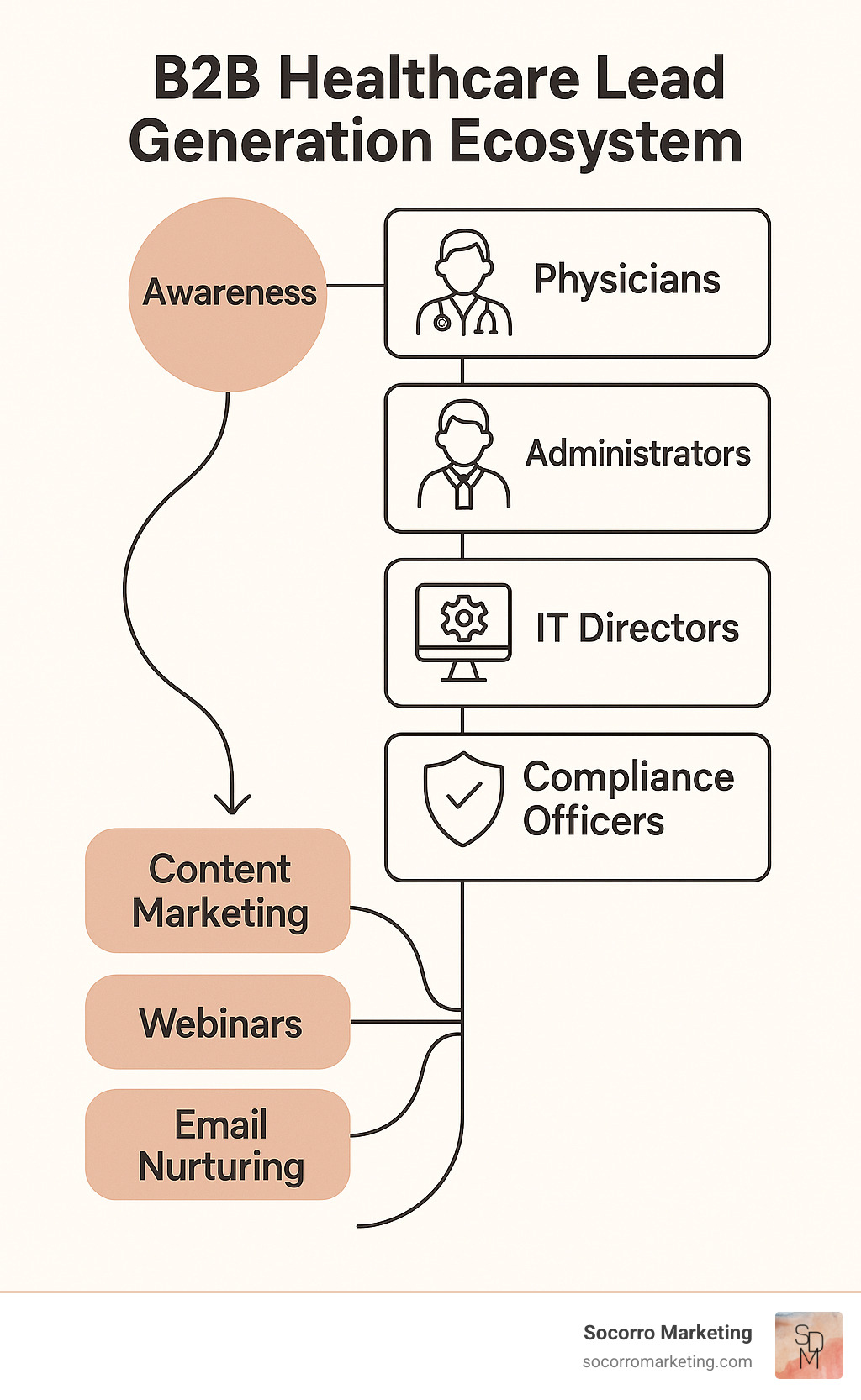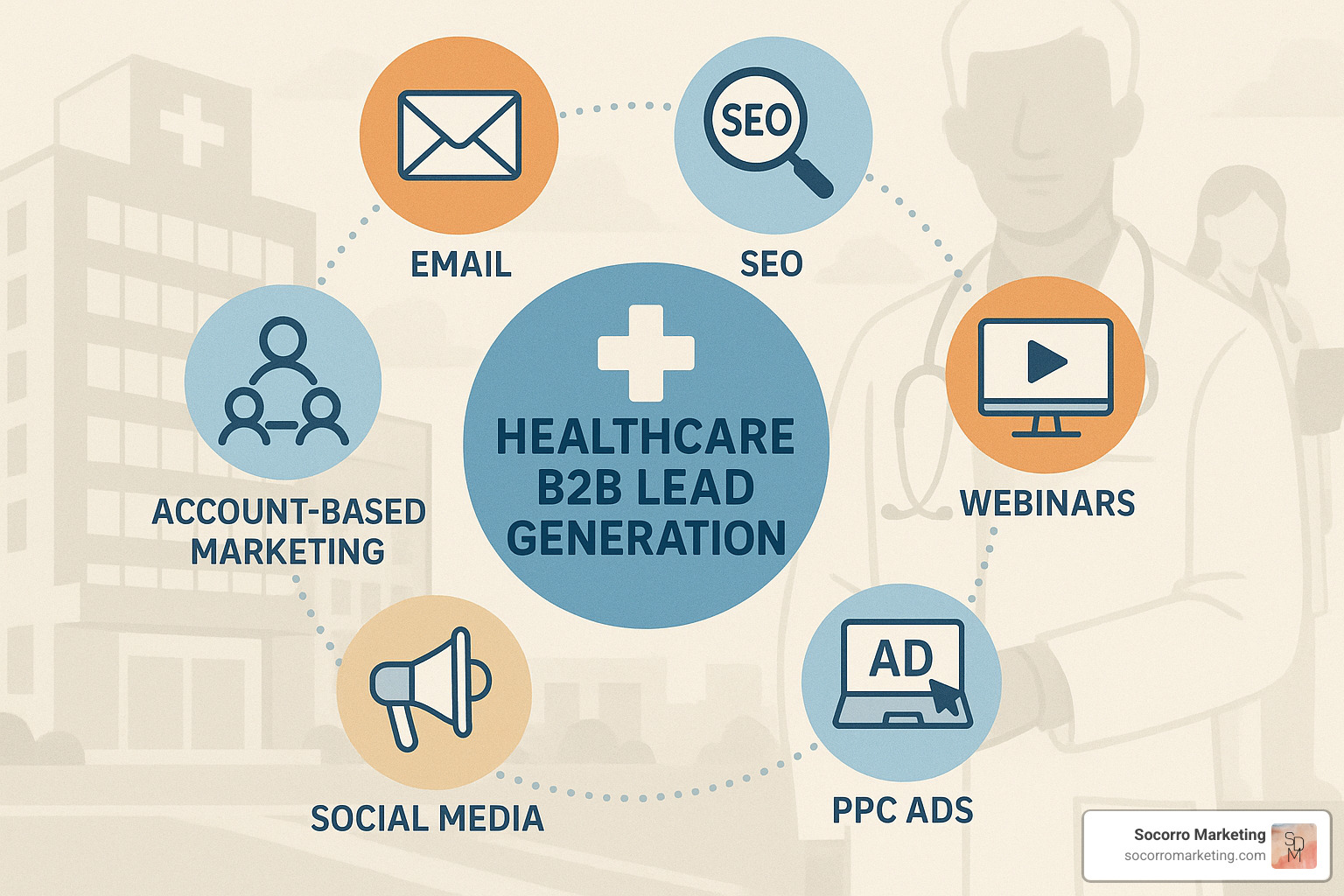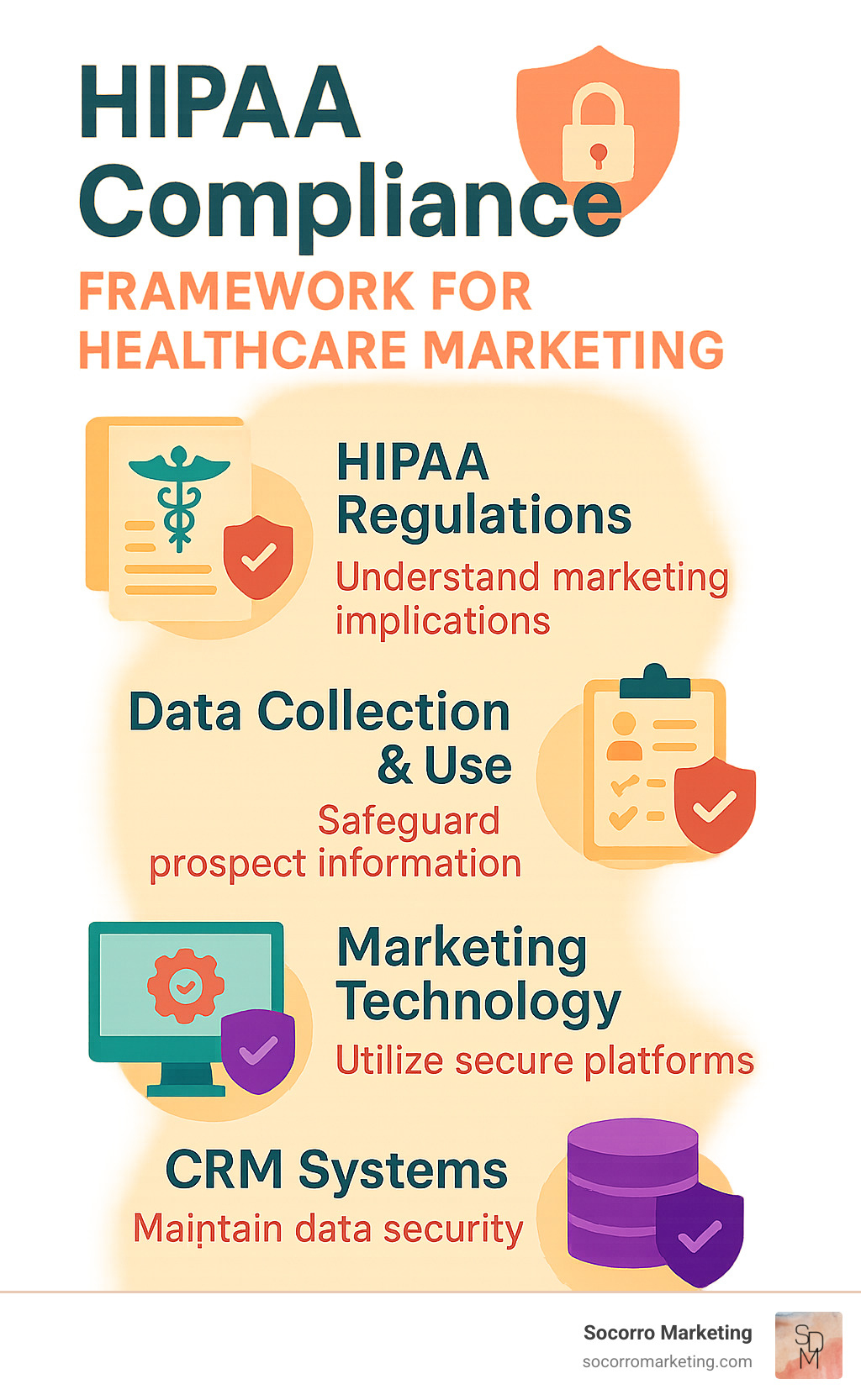B2B healthcare lead generation is one of the most challenging yet rewarding lead generation disciplines in business today. Unlike other industries where sales cycles might span weeks or months, healthcare organizations face an average 19-month purchase cycle with multiple stakeholders, strict compliance requirements, and risk-averse decision-making cultures.
Key B2B Healthcare Lead Generation Strategies:
The stakes are higher in healthcare. A single qualified lead can be worth $10,000 to $100,000+ in lifetime value, but the path to conversion requires deep clinical understanding and sustained relationship building. Healthcare buyers don't just evaluate vendors - they evaluate partners who understand patient care, regulatory complexity, and operational realities.
What makes this even more complex is the multi-stakeholder buying committee typical in healthcare. A single purchase decision might involve physicians focused on patient outcomes, IT directors concerned with security and integration, CFOs evaluating ROI, and compliance officers ensuring regulatory adherence.
I'm Grace Ascione, a registered nurse with an MBA and over 15 years of experience in healthcare marketing and B2B healthcare lead generation. My clinical background at UCHealth combined with business development experience at Gambro gives me unique insight into what actually drives healthcare decision-makers to action.

B2B healthcare lead generation is the art and science of finding, attracting, and nurturing potential customers within healthcare organizations who have both the need and buying power for your solution. Healthcare isn't just another industry - it's a completely different world with its own rules, timelines, and decision-making processes.
Over 50% of healthcare organizations report an average 19-month purchase cycle. This isn't because healthcare organizations are slow or indecisive. It's because the stakes are incredibly high. When a hospital considers a new Electronic Health Record system, they're making a decision that will touch every single clinician, affect patient safety protocols, and must play nicely with dozens of existing systems - all while maintaining strict HIPAA compliance.
A typical healthcare buying committee includes 6-12 stakeholders, each speaking their own professional language. Physicians care about clinical outcomes and patient care. IT Directors focus on security vulnerabilities and integration challenges. CFOs want clear ROI and total cost of ownership. Compliance Officers need assurance that everything meets regulatory standards.
The risk-averse culture of healthcare adds another layer of complexity. Patient safety isn't just a priority - it's the priority. Healthcare organizations naturally resist change because change introduces risk, and risk in healthcare can literally be life or death. They need overwhelming evidence that new solutions will improve rather than disrupt patient care.
Budget constraints make everything more challenging. Healthcare margins continue shrinking while regulatory requirements keep growing. Organizations often need multiple budget cycles to approve significant purchases, and they demand clear ROI demonstrations before moving forward. Understanding these financial realities becomes crucial for effective Defining Your Message and Brand with Medical Content Marketing.
The Scientific research on extended buying cycles confirms what we see every day: healthcare organizations spend significantly more time researching and evaluating than other industries.
Healthcare operates under unique constraints. Regulations like HIPAA, HITECH, and various state healthcare laws create compliance requirements that don't exist in other industries. Every marketing touchpoint must consider patient privacy and data security implications.
The technology complexity is mind-boggling. Most healthcare organizations juggle 50+ different software systems that must work together seamlessly. One compatibility hiccup can disrupt patient care, making technology decisions incredibly high-stakes.
Group decision-making is the absolute norm. While other industries might have individual executives making purchasing decisions, healthcare requires building consensus across multiple departments and stakeholder groups.
Awareness happens when healthcare organizations recognize problems through clinical outcomes data, regulatory changes, or operational headaches. At this stage, they're researching problems, not solutions yet.
Consideration begins once problems are clearly defined. Organizations start exploring potential approaches by reading whitepapers, attending webinars, and consulting with peers.
Evaluation gets serious when organizations develop formal criteria and begin comparing specific solutions. They want detailed technical specifications, compliance documentation, and solid proof of clinical outcomes.
Procurement involves formal RFP processes, legal reviews, contract negotiations, and detailed implementation planning.
Championing often gets overlooked, but it's crucial. Internal champions must build consensus and overcome resistance to change.
Renewal represents huge growth opportunities that many companies miss. Post-implementation, organizations evaluate success and consider expansion or renewal.
When it comes to b2b healthcare lead generation, healthcare buyers need a thoughtful, multi-channel approach that respects their time while addressing their complex decision-making process.
The most successful campaigns combine Account-Based Marketing (ABM) with educational content marketing, strategic SEO, and carefully orchestrated nurturing sequences. We've watched clients achieve 15% appointment-to-close rates using targeted ABM approaches, compared to the 3-5% they were seeing with broad-based campaigns.
Content marketing forms the backbone of everything we do in healthcare lead generation. Healthcare buyers consume an average of 13 pieces of content before they'll even consider talking to a vendor. The magic happens when you create content that speaks to both the clinical side and the business side of healthcare decisions.

SEO remains crucial for healthcare lead generation. With over 1 billion health-related queries happening daily on search engines, healthcare organizations are actively hunting for solutions online. Our SEO Strategy and Keyword Research approach focuses on specific, long-tail keywords that capture exactly what healthcare professionals are searching for.
Pay-per-click advertising can work beautifully in healthcare, but it requires precision. Healthcare keywords are expensive and competitive. Tools like Semrush keyword tools help us find opportunities where competition is lower but intent is high.
Webinars have become one of our most powerful lead generation tools. The educational format resonates with healthcare professionals who are used to continuing education and learning from experts. When we get the webinar promotion framework right, we can see registration increases of 177%.
Email nurturing isn't optional in healthcare - it's essential. With those 19-month sales cycles, you need to stay connected without becoming a pest. Over 51% of healthcare marketers report that segmented email lists are their most successful strategy.
Social media, particularly LinkedIn, plays a surprisingly important role. Nearly 70% of American healthcare companies use social media for lead generation and engagement. But healthcare social media requires a professional tone and careful attention to compliance requirements.
White papers are absolute gold in healthcare lead generation - ones that include clinical research, peer-reviewed studies, or original data analysis. Healthcare professionals want evidence-based information.
Clinical case studies provide the social proof that healthcare buyers crave. The most effective case studies include hard numbers: reduced readmission rates, improved patient satisfaction scores, decreased length of stay.
ROI calculators help bridge the gap between clinical benefits and financial outcomes. Healthcare CFOs need clear financial justification with tools that account for healthcare-specific variables like reimbursement rates and compliance costs.
Physician testimonials carry enormous weight in healthcare decision-making. When a respected clinician says something works, other clinicians listen.
ABM has become essential for b2b healthcare lead generation when targeting large health systems and hospital networks. The lifetime value of these accounts makes the personalized investment worthwhile.
Ideal Customer Profile (ICP) development looks at clinical specialties, organizational size, technology infrastructure, and decision-making processes. A 500-bed hospital has completely different needs than a 50-physician medical group.
Intent data helps identify when target accounts are actively researching solutions. Healthcare intent data requires careful interpretation due to extended evaluation periods.
Personalization requires understanding specific clinical challenges, regulatory requirements, and competitive landscapes for each target account.
Search Engine Optimization delivers exceptional long-term ROI. Our approach focuses on creating comprehensive pillar pages that address entire topic clusters rather than just individual keywords.
Targeted PPC campaigns can accelerate results while SEO builds momentum. Long-tail keywords that include specific conditions, procedures, or healthcare roles often provide much better ROI.
LinkedIn Ads have proven particularly effective for reaching healthcare decision-makers. The platform's professional targeting capabilities let us define audiences based on job titles, company size, and industry specialization.
Webinar frameworks provide scalable lead generation opportunities. Educational webinars that address clinical challenges or regulatory updates can attract hundreds of qualified leads per session.
When it comes to b2b healthcare lead generation, compliance isn't just a nice-to-have - it's absolutely essential. Healthcare operates under some of the strictest regulatory requirements in any industry.
HIPAA compliance affects far more than you might expect. While you're not directly handling patient records, any information that could potentially be linked to patient care falls under scrutiny. This means being extremely careful about how you collect, store, and use prospect information.
The HITECH Act extends HIPAA protections to business associates, which means your entire marketing technology stack must meet healthcare security standards. This covers everything from your CRM system to your analytics tools.
GDPR considerations add another layer of complexity, particularly when marketing to international healthcare organizations or using marketing technologies that process data in Europe.
Building your technology foundation requires a secure CRM system that provides audit trails, data encryption, and access controls meeting healthcare security standards.
Lead scoring in healthcare looks different from other industries. Traditional engagement scoring must be balanced with healthcare-specific indicators like clinical role, organization type, and regulatory environment.
Marketing automation must account for those famously long healthcare sales cycles and multiple stakeholder involvement. Automation sequences designed for 30-60 day sales cycles need significant modification to work effectively across 19-month healthcare buying journeys.
AI analytics can provide valuable insights into healthcare buyer behavior, but implementation requires careful consideration of privacy requirements and data sensitivity, as discussed in Scientific research on protecting patient data.
Data hygiene becomes even more critical in healthcare due to compliance requirements and the high cost of healthcare leads. This is particularly important for Looking for the Best Way to Optimize Your Email Marketing? where clean data directly impacts deliverability and engagement.

Creating a HIPAA-compliant lead generation engine is about building trust with healthcare organizations who take data security incredibly seriously.
Permission-based lists form the foundation of compliant healthcare lead generation. Cold outreach to healthcare professionals must be carefully managed to avoid potential violations and maintain professional credibility.
Encryption requirements apply to all data transmission and storage in healthcare marketing. This includes email communications, form submissions, and data transfers between your marketing systems.
Audit trails must be maintained for all lead generation activities. Healthcare organizations may request detailed information about how their data was collected and used.
Healthcare lead generation requires specialized marketing technology that can handle compliance requirements, extended sales cycles, and complex stakeholder management.
CRM selection should prioritize healthcare-specific features like HIPAA compliance, comprehensive audit trails, and integration capabilities with healthcare systems.
Marketing Automation Platforms must support long-term nurturing campaigns and complex stakeholder management across extended timeframes.
Analytics dashboards should provide healthcare-specific metrics and reporting capabilities that reflect healthcare-specific success indicators.
Success in b2b healthcare lead generation looks different than other industries. Healthcare organizations move slowly and deliberately, making traditional metrics incomplete measures of success.
The real indicators center around quality over quantity. Marketing Qualified Leads (MQLs) to Sales Qualified Leads (SQLs) conversion rates reveal whether your targeting truly understands healthcare decision-makers. When we see conversion rates below 25%, it usually means the messaging isn't speaking to actual clinical or operational pain points.
Cost per lead (CPL) in healthcare typically runs $320-400, significantly higher than general B2B averages. But this makes sense when you consider that a single healthcare customer might be worth $50,000 to $500,000+ in lifetime value.
Appointment-to-close rates become crucial because face-to-face meetings often determine deal outcomes. Our clients consistently achieve 15% appointment-to-close rates when their messaging demonstrates genuine clinical insight.
Pipeline velocity helps identify where leads get stuck in extended healthcare cycles. We track how quickly different stakeholder types move through the process.
Return on Investment (ROI) in healthcare lead generation often doesn't show up for 6-12 months minimum. This requires patience and careful tracking of early indicators like engagement depth and content consumption patterns.

| Metric | Healthcare Benchmark | General B2B Benchmark |
|---|---|---|
| Average Sales Cycle | 19 months | 3-6 months |
| Appointment-to-Close Rate | 15% | 8-12% |
| Cost Per Lead | $320-400 | $150-250 |
| MQL to SQL Conversion | 25-35% | 15-25% |
| Customer Lifetime Value | $50K-500K+ | $10K-50K |
Keeping prospects engaged across 19-month sales cycles challenges every traditional nurturing approach.
Drip sequences need multiple exit and re-entry points because healthcare buying isn't linear. A hospital might pause their evaluation for six months due to budget freezes, then suddenly they're back with urgent timeline pressure.
Behavior triggers become even more valuable in extended cycles. When someone who's been quiet for four months suddenly revisits your pricing page, that's a strong signal worth immediate attention.
Webinar follow-ups provide excellent nurturing opportunities because educational content aligns perfectly with healthcare professionals' learning preferences. Our systematic webinar follow-up sequences, detailed in Looking for the Best Way to Optimize Your Email Marketing?, convert attendees into qualified opportunities at much higher rates.
Re-engagement campaigns help revive dormant leads who may have simply paused their evaluation. Healthcare organizations often circle back to solutions they previously considered when circumstances change.
Healthcare lead generation optimization requires systematic analysis of what's working and what isn't.
A/B testing in healthcare demands patience and statistical rigor. With smaller sample sizes and longer feedback loops, you need to test high-impact elements rather than minor variations. We typically run tests for 60-90 days minimum.
Closed-loop analytics connecting marketing activities to actual sales outcomes provide the most valuable optimization insights. Understanding which touchpoints contribute to closed deals helps optimize budget allocation.
Feedback from sales teams offers crucial intelligence about lead quality and messaging effectiveness. Regular sales and marketing alignment meetings help identify which leads convert best.
For insights on building organic visibility alongside paid lead generation efforts, explore our guide on How to Increase Organic Search Traffic.
Healthcare marketers often ask us the same questions when they're starting their lead generation journey. After working with healthcare organizations across the Southwest for over 15 years, I've heard these concerns countless times. Let me share what we've learned.
B2B healthcare lead generation operates in a completely different world than other industries. The biggest difference? Regulations like HIPAA and HITECH create marketing constraints that simply don't exist elsewhere. Every email, every form, every piece of content must consider patient privacy implications.
But regulations are just the beginning. Healthcare organizations need clinical validation for everything. While a software company might buy a new tool based on productivity claims, hospitals need peer-reviewed studies, clinical outcomes data, and extensive proof that solutions actually improve patient care.
The extended sales cycles also set healthcare apart dramatically. We're talking about an average 19-month purchase cycle compared to 3-6 months in most other industries. This isn't inefficiency - it's necessity. When decisions affect patient safety and regulatory compliance, thorough evaluation becomes critical.
Perhaps most challenging is the expanded decision-making committees. While other industries might have 2-3 decision-makers, healthcare organizations typically involve 6-12 stakeholders. You're simultaneously convincing physicians focused on clinical outcomes, CFOs analyzing ROI, IT directors evaluating security, and compliance officers ensuring regulatory adherence. Each speaks a different professional language and has different priorities.
This multi-stakeholder reality means your messaging must work on multiple levels. A white paper that resonates with a Chief Medical Officer might completely miss the mark with a Chief Financial Officer. Success requires understanding each stakeholder's world and speaking their language authentically.
This is probably the most important question we get, and the answer requires some patience. Healthcare lead generation typically takes 6-12 months to show meaningful ROI, with full optimization requiring 12-18 months. This timeline directly reflects that 19-month average purchase cycle we see consistently across healthcare.
But here's what I tell clients: don't wait 12 months to see if things are working. Leading indicators appear much sooner. Quality content engagement, webinar registrations, and initial sales conversations often begin within 30-60 days of campaign launch. The key is measuring progress through these early signals rather than expecting immediate revenue.
Our experience across Colorado, Utah, Arizona, and New Mexico shows a clear pattern. Clients who commit to 12-month healthcare lead generation programs achieve significantly better results than those expecting quick wins. The extended investment period allows for proper relationship building and trust development that healthcare buyers absolutely require.
Nurture campaigns become crucial during these extended cycles. Healthcare prospects might go silent for months due to budget cycles or organizational changes, then re-engage with renewed urgency. Your lead generation system must be designed to maintain relationships across these lengthy timelines.
The good news? Once healthcare lead generation systems are properly optimized, they tend to produce consistent, high-value results. Healthcare customers often have lifetime values of $50,000 to $500,000+, making the extended investment period worthwhile.
Traditional marketing metrics only tell part of the story in healthcare. While click-through rates and conversion rates matter, healthcare-specific metrics provide the real insights into campaign effectiveness.
Sales Qualified Leads (SQLs) remain the gold standard for measuring lead quality. But in healthcare, we also track meetings booked with key stakeholders since face-to-face conversations often determine deal outcomes. Our specialized approach typically achieves 15% appointment-to-close rates, significantly higher than general B2B averages.
Pipeline velocity by stakeholder type helps identify which decision-makers move fastest through your sales process. We've found that IT directors often engage quickly on technical specifications, while clinical leaders take longer but carry more influence in final decisions.
Multi-stakeholder engagement within target accounts shows whether you're successfully building consensus across decision-making committees. A truly qualified healthcare lead often involves 3-4 engaged contacts within the same organization.
Revenue growth remains the ultimate measure of success, but healthcare's extended cycles require patience. Customer Acquisition Cost (CAC) and Customer Lifetime Value (CLV) ratios become particularly important. A healthcare customer might cost $5,000-10,000 to acquire but generate $100,000+ in lifetime value.
Content engagement depth also provides valuable insights. Time spent with materials, return visits, and content sharing indicate genuine interest versus casual browsing. Healthcare professionals are trained to thoroughly evaluate information, so deep engagement often signals serious consideration.
The key is setting up measurement systems that account for healthcare's unique characteristics while still providing actionable insights for optimization.
The journey through b2b healthcare lead generation reveals a landscape unlike any other in the business world. While the 19-month sales cycles and multi-stakeholder committees create genuine challenges, they also create incredible opportunities for those who truly understand healthcare.
When other industries are fighting over leads worth a few thousand dollars, healthcare organizations are making decisions worth hundreds of thousands. A single well-nurtured healthcare lead can transform your business, but only if you approach it with the clinical understanding and regulatory awareness that healthcare demands.
The most successful healthcare lead generation strategies share three common elements: they prioritize compliance from day one, they speak authentically to clinical concerns, and they maintain patient engagement across extended sales cycles. Healthcare buyers can spot generic marketing from a mile away.
What we've learned from working with healthcare organizations across Colorado, Utah, Arizona, and New Mexico is that authentic clinical insight beats flashy marketing tactics every time. Healthcare professionals trust peers who understand their world of patient care, regulatory pressures, and operational realities.
Your technology stack and data approach must reflect healthcare's unique requirements. HIPAA compliance isn't just a checkbox - it's fundamental to building trust with healthcare buyers.
Measurement in healthcare requires both patience and precision. While you're waiting for those 19-month cycles to complete, focus on healthcare-specific metrics like multi-stakeholder engagement, clinical content resonance, and appointment-to-close rates.
At Socorro Marketing, our nurse-managed approach isn't just a marketing angle - it's the foundation of everything we do. When Grace Ascione reviews your campaign strategy, she brings 15 years of clinical experience from UCHealth and business development expertise from Gambro. She understands why a physician's workflow concerns differ from an IT director's security priorities.
This clinical authenticity shows in every piece of content we create, every campaign we design, and every conversation we have with healthcare prospects. We don't just market to healthcare - we understand healthcare because we've lived it.
The healthcare industry continues evolving rapidly. The organizations that master healthcare lead generation now will be positioned for sustained growth as these changes accelerate.
Ready to see what happens when clinical expertise meets proven marketing strategies? Our comprehensive Digital Marketing approach combines the clinical insight your healthcare prospects need with the lead generation expertise your business deserves. Let's discuss how our unique healthcare perspective can transform your growth trajectory.